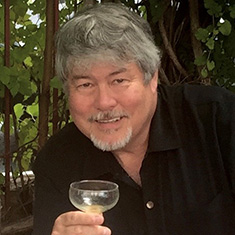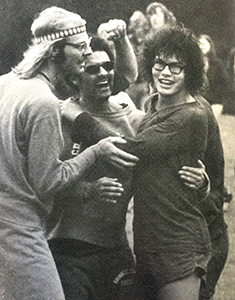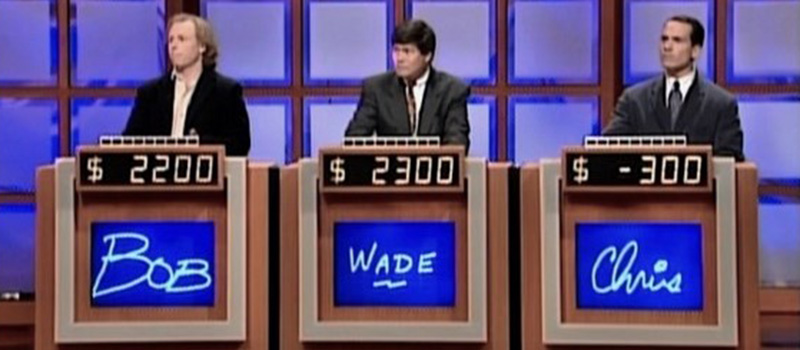My Jeopardy! experience
 Wade Lee ’77
Wade Lee ’77
Editor’s note: In remembrance of the one-year anniversary of Alex Trebek’s death, Wade Lee ’77 wrote the following first-person account of his Jeopardy! journey.
Alex Trebek was an icon and a legend.
He had been part of so many of our lives. I think about one of the great lines from The Field of Dreams where James Earl Jones bellows “The ONE constant through the years has been BASEBALL.” I revised this to say that the ONE constant through our past 35 years had been ALEX TREBEK ON JEOPARDY! Alex was far more than a game show host. He became the embodiment of courage, commitment, and professionalism, and an ambassador for learning. He made knowing stuff cool.
My Jeopardy! journey started in 1964 at age 10 in the 4th grade. My teacher, Mrs. Rudy, was one of THOSE teachers. She was an elderly woman who had been teaching all her life. And she believed in this little Asian kid. It changed my life, the way the best teachers do. She inspired me to want to learn things.
And then a new show – Jeopardy! with Art Fleming – aired that same year. It was all about KNOWING stuff, and I caught the bug. I was memorizing things – presidents, state capitals, heavyweight champions, Cy Young Award winners – anything with a list. The Perfect Show had come on when I had The Perfect Teacher. Sadly, a few years later, Jeopardy! Art Fleming style disappeared with the 1960s.
In the mid-1980s television executives decided to bring it back. They gambled by putting it on during prime time, and hired an articulate, personable, and somewhat cerebral personality, Alex Trebek, as host. The formula worked, and the new brand was born.
Tryouts and stage presence
In 1997, Jeopardy! was having tryouts in my area. It was all in-person in those days. I took a short, 10-question quiz. I passed and was invited to take a 50-question test several weeks later. That second test was designed to be rough. They wanted to ensure they were only getting the top players. They tested about 40,000 per year, and only about 200 actually made the show.
Twelve in my group of about 300 passed the test. The “trivia” part of the process was over. We were now auditioning for THE SHOW! We had to stand in front of the group and tell a short story, and then play a mock game so they could evaluate our stage presence, energy level, and how we worked the board.
The story portion threw many for a loop. Interestingly, the two skill sets – instantaneous fact recall and presentation skills – are not necessarily complementary. Many who are great at trivia are extremely uncomfortable in front of an audience. The Jeopardy! folks screen for knowledge and stage presence. The last thing they want is to put on a contestant who may freeze up under the lights. And those lights and the pressure of the game can absolutely play tricks on your mind.
As the first two prospective contestants were telling their stories, I made a high-risk decision on the fly. I have gained a million stories over the years, and I opted for the “go big or go home” variety.
My turn. I stand up and say, “Let me tell you about the time Jesus bought me a beer…” After an initial hush from the group, I smiled and started filling in the blanks.
‘It was back in 1973, my senior year in high school. The Broadway traveling version of the hit musical, Jesus Christ Superstar, was coming to our town. As it turns out, the lead violin was an old family friend. He gave me tickets to the show as well as passes to the cast party afterward. I was thrilled to see the show, and was at the cast party, standing near the bar empty handed. The guy who played Jesus entered the room. I tell him how much I enjoyed his performance. He grabs a beer from the bar and hands it to me. We exchange pleasantries, he jokingly blesses me, and continues to work the room. It was surreal. Jesus had just bought me a beer and given me a great story.’
Preparation makes perfect
 Lee, right, celebrates with
Lee, right, celebrates with
fellow students at a soccer
game in 1975.
A few months later, I got a life changing call. They wanted me in three weeks. I had to scramble. In some ways, I had been preparing my whole life. But now it was real.
My strategy was simple:
- Focus on the Weak Stuff – I’d seen about 1,000 shows over the years. I knew the kinds of categories that show up often. I identified a few “Weak Stuff” categories that were likely and where I was vulnerable – classical composers, artists, Canadian geography, the Bible – and focused a ton of time on those.
- Tickle the Brain Cells – I spent an hour a day reviewing stuff I knew but needed to keep fresh – vice presidents, Academy Award winners, world capitals, sports, TV shows, etc.
- Go two inches deep and 10 miles wide – Too much detail would be counter-productive. I went to my daughter’s middle school. Their Quiz Bowl coach gave me a box full of floppy disks they used for their 8th grade trivia contests. Yes, FLOPPY DISKS. It was 1997! There were about 10,000 questions. Perfect for 10 miles wide, two inches deep.
- Review wagering strategies – This is THE MOST frequently overlooked aspect of the competition. I had been a math and economics major at Grinnell and studied mathematical modeling and game theory in graduate school. I was all over this one.
- Exercise daily – I wanted to keep the blood circulating and the mind sharp. I had been a three-time All-Conference soccer player at Grinnell and had boxed professionally for a short while after college. I thought I would dominate the buzzer.
Slaying the dragon
Jeopardy! tapes two-weeks of shows in two days – five games on Monday and five on Tuesday. They invite 20 contestants for each round of taping. We all arrived bright and early on Monday. They reviewed rules and had us do some dry runs to get us acclimated with the buzzer. There is a row of lights around the board that you never see on TV. When Alex finished reading the question, the lights came on. THEN you can buzz in. If you buzz in early, you get locked out for a quarter-second. The timing is tough.
Back in 1997, a champion could win a maximum of five games. Afterward, they would get an automatic bid to The Tournament of Champions, and three new contestants would be chosen. The returning champion that day, Bob Harris, was tough to beat. The contestants for each new game are chosen at random – pulled literally out of a grocery bag – before each new match. We are all sitting there watching Bob annihilate contestant after contestant, secretly hoping we would not be called to play him. He was a BEAST! He had never even been behind at any point. I was literally calculating the probability in my head that Bob would win five and that I would play with a fresh set of contestants when I heard my name called. No easy path. I would have to slay the dragon.
Veteran announcer Johnny Gilbert introduces us. Reality sets in. They reveal the categories. Nothing was in my wheelhouse, but a few were in my Weak Stuff categories where I had become pretty strong. First question. I KNOW THIS. I ring in. Bob gets the nod. Second question. I KNOW THIS and ring in. Bob gets the nod. They go through a category and a half, and I have not gotten my buzzer in for a single question. My mind starts to do what it should never do – wondering if I will be the first contestant in the show’s history to never answer a SINGLE question. But then, BANG, I get in, answer correctly, and start to roll.
 Wade Lee ’77 held the lead briefly during a November 1997 episode of Jeopardy!
Wade Lee ’77 held the lead briefly during a November 1997 episode of Jeopardy!
By the interview session, I am in the lead. Alex asks me about my brief boxing career. I maintain my lead through Round 1.
The story goes downhill after that. Double Jeopardy starts. Bob gets sharper. He runs a category. His timing on the buzzer is unworldly. He hits the Daily Doubles. Bob wins. Again! When it was over, Alex came over to me and jokingly threw a left jab in my direction. He made me laugh. He was still thinking about having a former professional boxer on his show. He always liked things that were out of the ordinary. That was Alex.
Bob Harris wound up being one of their most successful and noteworthy of the pre-Ken Jennings champions, appearing in several of their Million Dollar Championships. He wrote a book about it all, The Prisoner of Trebekistan, that Alex highlighted (along with Bob) in his farewell season.
Regardless of the result, I checked off a major bucket list item. Here are some of my takeaways:
- I was part of a cultural phenomenon. There have been about as many Jeopardy! contestants as there have been former National Football League players. It was an honor and a privilege to be a part of this.
- Alex has probably done more to promote education and learning than any other person in this generation. He began having Teachers Tournaments as a special tribute to educators and always honored their contributions.
- Alex walked the walk. He continued his dedication to his craft until the day he died. He never wallowed in pity. He died doing what he loved – what he was meant to do. He was a role model and an inspiration.
- The Buzzer is a BEAST.
- Bob Harris and I have remained friends over the years.
Most importantly, I never felt like I lost. My old soccer coach, John Pfitsch, taught me that you should win with grace, and that you should lose with the same grace. The honor was in playing, and learning. And he was right.
Afterword from Wade Lee:
“I’m a graduate from the class of 1977, which sounds almost prehistoric now. But even then, Grinnell College was ahead of the curve. For me, Grinnell defined growth. As a young adult, I had the chance to follow so many paths, including sports and academics – things that led me to where I am today. I played soccer at Grinnell for the legendary John Pfitsch. That was an education, in and of itself. Academically, I look back in awe at the quality of the teaching. Our professors genuinely cared, and I was taught critical thinking before it was ever ‘a thing.’ I was lucky. And while part of this seems like it was lifetimes ago, a lot more of it seems like it was yesterday.”